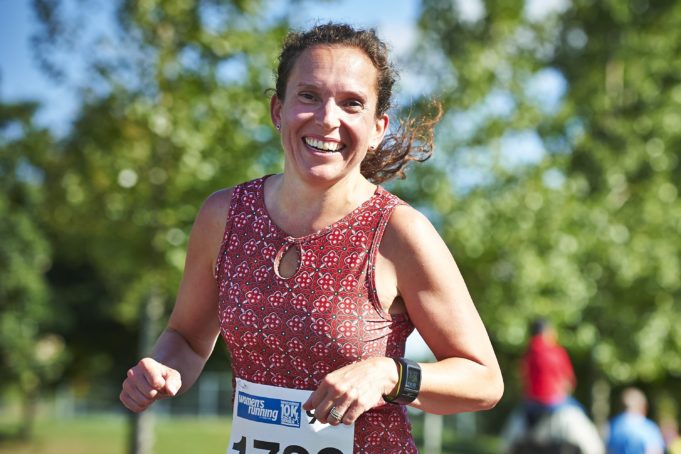Have you ever given blood?
The NHS needs 6000 donations of blood every day and giving a pint of your very best can literally save a life. One question that crops up from time to time on Twitter is how soon after giving blood is it safe to run?
Biology basics
To understand this, it’s helpful to have a quick trip back to a biology lesson! We have around five litres (ten pints) of blood circulating around our body. It’s made up of:
55% plasma – this is a straw-coloured liquid that all the cells and other blood products float in; it’s about 90% water.
45% cells – there are three types:
• Red blood cells (RBCs)
• White blood cells (WBCs)
• Platelets
[restrict userlevel=”subscriber”]
Platelets stop us bleeding by clumping together. Our WBCs fight against infection. In terms of giving blood and exercising, it’s our RBCs that we’re particularly interested in. RBCs contain a protein called haemoglobin (Hb), which is rich in iron; this is what gives blood its red colour. Hb carries oxygen around the body; oxygen molecules attach to the Hb as the RBCs travel through the lungs. They’re then transported to our muscles which can literally be screaming out for oxygen when we’re training hard. Blood is also important in transporting away waste products produced by exercise and in helping our body to regulate its temperature and get rid of excess heat.
When you give blood
When you make a donation you give 470 mls of blood; just under a pint, so this works out as around 10% of your blood volume. To maintain the status quo, your body very quickly increases the blood volume back to normal by topping up the fluid part of the blood. This is done within hours and makes sure your blood pressure remains normal. The WBC and platelet numbers return to normal over the course of a few days. The RBC levels however take longer; it can be 6 to 12 weeks before RBCs are back to their previous levels. This is why it’s not recommended to give blood more frequently than every 12 weeks and you’ll always have a blood test before a donation to check your Hb levels are normal.
When can you run?
• Don’t go for a hard run before you donate, the blood service asks us to avoid strenuous exercise beforehand.
• Even if you feel fine don’t go for a run just after giving blood. It’s best to wait 24 hours. Drink plenty of fluids during this rest period.
• When you do your first run after donation make it a short, easy one, just to see how you feel.
• Bear in mind you won’t get your best performance within two or three weeks of donation. You need to allow time for your Hb levels to rise. It’s therefore better to donate when you’re recovering AFTER your target race rather than just before.
What might happen if I run too soon?
In the early stages after donation you may feel light headed and faint. That’s why it’s important to rest and drink plenty of fluid while your blood volume is returning to normal. Beyond this it’s really the fact that your body will just have to work harder than it’s used to. It’s functioning on less than the full whack of RBCs and it’s diverting its efforts to replenishing the stock. Your heart might beat a bit faster, it can make you feel tired and breathless when you exert yourself. Some people won’t feel affected at all by giving 10% of their blood away so that’s why I suggest just taking that first run easy to gauge what effect donating has had on you.
Diet tips
Make sure you have a diet that’s rich in iron. The average life span of a RBC is 120 days so your bone marrow is constantly making new ones. To do this effectively it needs a good supply of iron. As runners, one of the best things we can do for our health is to make sure that we’re supplying it with good fuel and it’s never too late to make some improvements in your diet, particularly if you’re a blood donor. Iron-rich foods include: meat, sea-food, pulses and beans, nuts and seeds and green leafy veg such as kale. Drinking a glass of orange juice (containing vitamin C) with your meal will help the absorption of iron from the food you eat.
You can take an iron supplement if you feel your diet is lacking in iron but be wary of taking one if you think you’re anaemic – read my previous blog on Anaemia for Runners (here.
The UKRunChat experiences.
How you feel after giving blood is a very individual thing. It’s great that we can share and learn from each other’s experiences. Here are some of yours on this subject:
“I made the mistake of trying to run 16 miles the next day, didn’t have the energy to finish 8 miles.”
“I’m generally ok to do stuff 24 hrs after, haven’t tried sooner. Lots of fluid is good.”
“Don’t do what I did a couple of years ago and give blood in the evening and run the following morning.”
“I tried running 16 hrs after a donation, felt awful. Definitely take it easy!”
“I have a love/hate relationship with giving blood. I do it but it knocks performance for about 3 weeks.”
“Never had any problems before/after donating but 2 weeks before my marathon probably needs a rethink …”
Becoming a blood donor
The NHS badly needs blood donors. With a little planning and good nutrition, running and giving blood are compatible.
To find out more and to book an appointment to give blood just visit www.blood.co.uk






